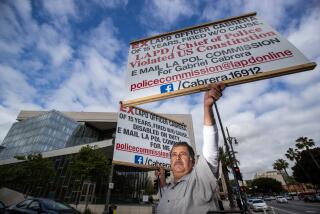Policeman Should Investigate More Financial Goals
- Share via
Gabriel Gaxiola wants to be “the millionaire next door.”
Inspired by the popular book of that title, which chronicles the financial habits that make people wealthy, the Los Angeles police officer wants to amass a $1-million portfolio by the time he turns in his badge.
“I really want a good nest egg for retirement,” said 27-year-old Gaxiola, an avid amateur boxer who patrols the Wilshire district when in uniform. “I’m serious about having $1 million.”
Gaxiola’s target seems ambitious, given that he plans to leave the force at the relatively young age of 45. He will be eligible for a pension at that time, after accumulating 20 years of service.
In fact, Gaxiola’s quest is not out of reach, said Manhattan Beach financial planner Preston Caves. Gaxiola’s relatively frugal spending habits--for example, his monthly rent is just $325--and his decision to make an unusually early start on his journey to financial freedom bode well for the lawman, Caves said.
But the planner urged Gaxiola not to focus too narrowly on his million-dollar dream. For one thing, there are several issues he must address first, such as paying down his car loan, diversifying his investments and establishing an emergency fund--he has only $500 in ready cash in the bank.
Gaxiola also must think hard before leaping into an investment he is contemplating: purchasing a small apartment building.
In addition, Caves said his projection that Gaxiola could accumulate $1 million--in 2001 dollars--in 18 years is based on an 11% annual investment return and 3% inflation rate. But Caves warned that there’s little chance everything will turn out exactly as planned. For instance, although the Standard & Poor’s 500 stock index has produced average annual returns of about 10% in the last 70 years, its annualized return since January 1999 is less than 4%. Likewise, the government reported last week that inflation is running at an annual rate of almost 8%.
Moreover, inevitable lifestyle changes also will affect how much he’s able to earn and save over the years.
For example, Gaxiola, who shares an apartment with a brother and a friend, expects to marry, have children and buy a home--although the time frame for each of those milestones is unclear. And although he now makes $60,000 a year, including overtime pay and a bonus for being bilingual, he expects to win some promotions--and raises--during his LAPD career.
“Your numbers can change in a hurry, depending on what happens in your life,” Caves said. “If you have four [kids], you might not be saving as much money as you expect.”
One thing is certain, however: Gaxiola has shown a commendable willingness to take control of his financial life.
As a 21-year-old student at UCLA, for instance, he worked in the university’s mail room to earn $2,000 to fund an individual retirement account.
“The professors talked about the importance of starting early and enjoying the benefits of compounding interest, so that’s what I did,” said Gaxiola, who majored in sociology and business administration.
He then taught high school English for six months before joining the police force.
“Teaching was a lot more stressful than being a police officer,” Gaxiola said. “I worried about the kids all the time, wondering whether they would graduate and what they would do after they finish school.’
From college to teaching to the police force, Gaxiola has managed to add $2,000 each year to his Roth IRA, which is now worth $14,000. Gaxiola also has chipped in $12,000 to his LAPD deferred compensation plan and is contributing $8,500 a year to it. And he’s socked away $8,000 in a mutual fund to which he adds an average of $400 each month.
Also in Gaxiola’s favor is the fact that a student loan and a Jet Ski loan totaling $600 a month will be paid off in June. He also expects to receive a $300-a-month raise this summer. He intends to pour the combined $900 into his mutual fund savings.
In all, Gaxiola has $34,000 in current savings and is on track to make annual contributions totaling $26,100 to his accounts.
“You’re off to a good start,” Caves told Gaxiola. “There’s not many people thinking about IRAs when they’re in college.’
That said, Caves suggested several ways Gaxiola could improve his current financial situation.
For starters, he recommended that Gaxiola accelerate payments on the $19,000 loan on his 1999 Ford Expedition, which has an interest rate of 9%.
“If you put that money into an investment, it would have to earn 13% or 14% a year to be a better move than paying down the car loan when you figure in the tax consequences,” Caves said. Gaxiola could apply some of his mutual fund savings or simply increase his monthly payments--and reduce the amount he has earmarked for savings--to achieve this goal.
Caves also pointed out that most of Gaxiola’s $34,000 nest egg is parked in growth-oriented U.S. stock mutual funds. Gaxiola made these selections on the advice of friends and by looking at the past performance of funds in the LAPD’s deferred compensation plan.
“I’d like to see your money spread out a little more,” Caves said. “Wider exposure will help you avoid the sharp downturns that could hit an individual area of the market.’
Caves suggested that 25% of Gaxiola’s investments be moved to an international fund, such as Harbor International (five-year average annual return: 12.6%).
He also would like Gaxiola to commit 15% of his investments to small-stock funds, such as Managers Special Equity (five-year average annual return: 20.1%), and 20% to a mid-size company fund, such as the Sound Shore fund (five-year average annual return: 17%).
The remaining 40% could be placed in a solid index fund, such as Vanguard Index 500 (five-year average annual return: 18.7%). Caves made similar selections from among the choices Gaxiola has in the deferred compensation account.
Gaxiola is reluctant to part with his funds, particularly the Van Kampen Emerging Growth Fund A. “It’s been very good to me,” he said.
But Caves warned Gaxiola not to “fall in love” with an investment and reminded him that past performance does not guarantee future results.
He also tried to dampen Gaxiola’s ardor for a plan floated by a friend: buying a three- or four-unit apartment building, perhaps from a bank that has foreclosed on a previous owner. Gaxiola envisions living in one unit and renting the others.
Although not vetoing the move, Caves warned about significant risks with this type of deal, such as cash-draining vacancies and maintenance expenses.
Nevertheless, if Gaxiola is serious about buying property within the next two years, his money doesn’t belong in a volatile stock fund such as the Van Kampen Emerging Growth Fund A. A wiser choice, Caves said, would be the T. Rowe Price Spectrum Income fund (five-year average annual return: 7.01%), which is primarily invested in bonds.
“The sooner you’re going to need the money, the more conservative your choices should be,” Caves said.
Caves also urged Gaxiola to set aside at least $5,000 for emergencies. This could be placed in a money market account or a similarly conservative investment. Gaxiola, who runs and works out at a boxing gym in his spare time, isn’t sold on the need for such a fund.
But he does appreciate Caves’ admonition to adopt a more flexible approach to his financial goals.
“I’m glad to get confirmation that my goals are possible,” Gaxiola said. “But I can see that I’m going to have to balance some of my goals and that there might be some trade-offs.”
*
Graham Witherall is a regular contributor to The Times.
*
To be considered for a published Money Make-Over, send your name, age, phone number, income, assets and financial goals to Money Make-Over, Business Section, Los Angeles Times, 202 W. 1st St., Los Angeles, CA 90012, or to money@latimes.com.
*
You can save a step and print or download the questionnaire at https://www.latimes.com/makeoverform. Recent columns are available at https://www.latimes.com/makeover.
(BEGIN TEXT OF INFOBOX / INFOGRAPHIC)
This Week’s Make-Over
* Subject: Gabriel Gaxiola, 27
* Occupation: Los Angeles police officer
* Income: $60,000
* Goal: Accumulate $1 million for early retirement
*
Current Portfolio
* Cash: $500 in checking account
* Retirement accounts: $14,000 in Roth IRA invested in Oppenheimer Main Street Growth and Income fund; $12,000 in LAPD deferred compensation retirement plan invested in Growth Fund of America and Hartford Capital Appreciation fund
* Other accounts: $8,000 invested in Van Kampen Emerging Growth fund A
* Debts: $19,000 on 1999 Ford Expedition, $2,000 on Jet Ski and $2,000 on student loans
*
Recommendations
* Establish an emergency fund
* Pay off car loan early
* Diversify mutual fund holdings; recommended purchases: Harbor International, Managers Special Equity, Sound Shore fund, Vanguard 500 Index, T. Rowe Price Spectrum Income
Meet the Planner
Preston Caves is a fee-only certified financial planner and chartered financial analyst. His firm, Caves & Associates in Manhattan Beach, specializes in investment management for retirement plans and large private portfolios.
More to Read
Inside the business of entertainment
The Wide Shot brings you news, analysis and insights on everything from streaming wars to production — and what it all means for the future.
You may occasionally receive promotional content from the Los Angeles Times.










